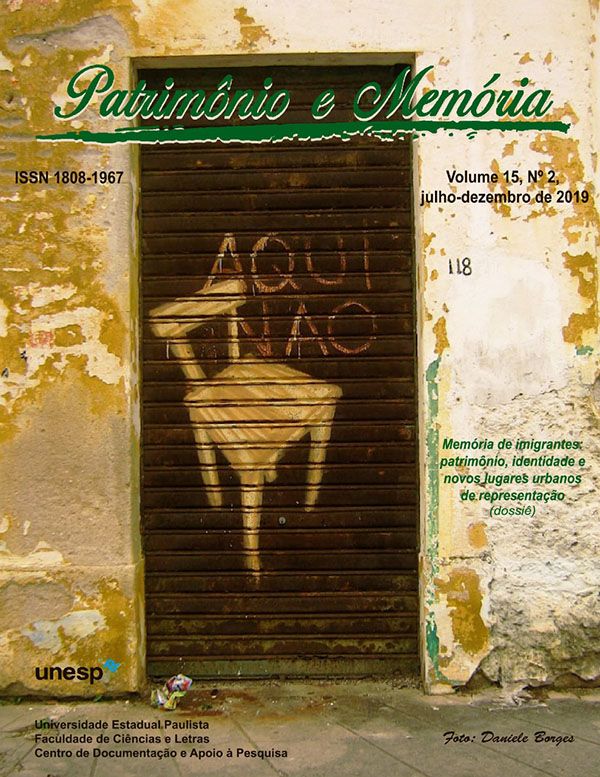Resistencia cultural de la comunidad gallega de Venezuela
DOI:
https://doi.org/10.5016/pem.v15i2.3273Palavras-chave:
Comunidad binacional-bicultural, Espacios simbólicos, Galleguismo, Memoria colectiva, Resistencia culturalResumo
Galicia es una región situada al noroeste de España, desde allí emigraron a Venezuela por causa de la guerra civil española y la postguerra, un grupo de personas buscando un mejor destino. Esta investigación, que sigue un proceso de mayor dimensión, se abordó con una mirada cualitativa, etnográfica y autobiográfica, y busca interpretar y comprender, desde la voz de los actores sociales, el proceso de construcción de significados que emergen del tejido identitario de la comunidad binacional-bicultural gallego-venezolana que reside en Caracas. Gracias a la construcción de espacios simbólicos, (PÉREZ, 2003) se mantuvo su cultura, su idioma por medio de las casas de asociación, los programas de radio, las publicaciones, las agrupaciones folklóricas y deportivas llevados por el galleguismo, construyendo una memoria colectiva (HALBWACHS, 1976) y una resistencia cultural, (DÍAZ, 1999), toda vez que la dictadura pretendía unificar España en detrimento de la identidad de las comunidades hoy llamadas autónomas.
Referências
*Entrevistas*
E1. Juan Manuel Giráldez (Manolo Giráldez). (1º/11/2017)
E2. Manuel Alvarez Quiroga (05/05/2016)
E3. Xose Manuel López Trelles (24/06/2018)
E4. Maricarmen Cives Lado (20/11/2018)
E5. Maria Elena Lado Lema (10/03/2016)
E6. Cándido Rodríguez (03/08/2018)
E7. José Fidel Cives Lado (05/10/2018)
*Bibliografia*
BERMEJO, Xose. Historia de Galiza. España: Alhambra, 1980.
CAMPRA, Marián. Andurriña, la voz de los gallegos en Sevilla. España: Lar Gallego de Sevilla, 2018.
DÍAZ, Héctor. El jardín de las identidades. Caracas: El Perro y la Rana, 2016.
FLICK, Uwe. Introducción a la investigación cualitativa. Madrid: Morata, 2004.
FONTANA, Josep. Escribir historia con una guerra civil por medio. España: Barcelona Crítica, 1999.
GAOS, José. Confesiones profesionales. México: FCE, 1958.
GÓMEZ, Luis Emeterio. Premios Nacionales de Cultura Federico Fernández 1995. Caracas: El Perro y la Rana, 2009.
GONZÁLEZ, Enrique Alí. Leer la identidad venezolana a la luz de las comunidades étnicas biculturales de América Latina. Revista Venezolana de Economía y Ciencias Sociales, Caracas, v. 15, n. 3, 2009.
HALBWACHS, Maurice. Les cadres sociaux de la mémoire. Paris: Mouton, 1976.
LOZANO, Daniel; DELGADO, Lola. Historias de ultramar: aventuras y desventuras de los españoles de hoy en América Latina. Barcelona: Península, 1999.
MARQUÈZ, Salomó; FRECHILLA, Juan. La labor educativa de los exiliados españoles en Venezuela. Venezuela: Fondo Editorial de Humanidades y Educación U.C.V., 2002.
MARTÍNEZ, Xurxo. Crónica do exilio galego-Venezuela. Galicia: Nosa Terra, 2009.
NUÑEZ, Xose. La Galicia austral: la inmigración gallega en Argentina. Argentina: Biblos, 2001.
PÉREZ, Rafael. Memoria colectiva, identidad y patrimonio cultural. 2003. Disponible en: <http://www.cdi.gob.mx/pnud/seminario_2003/cdi_pnud_ pereztaylor.pdf>.
RAMOS, Froilán. La inmigración en la administración de Pérez Jiménez (1952-1958). Heurística: Revista Digital de Historia de la Educación, n. 13, 2010.
RIVAS, Manuel. ¿Qué me quieres amor? España: Galaxia, 1955.
SERRYN, P.; BLASELLE, R. Gran Geografía universal ilustrada. España: Argos- Vergara 1981.
THOMAS, Hugh. La guerra civil española. Grijalbo: Barcelona, 1985.
UGAS, Gabriel. Epistemología de la Educación y la Pedagogía. Táchira: Ediciones del Taller Permanente de de Estudios Epistemológicos en Ciencias Sociales, 2005.
ZEA, Leopoldo. Filosofía y culturas latino-americanas. Caracas: CELARG, 2014.
Downloads
Publicado
Como Citar
Edição
Seção
Licença
Copyright (c) 2019 Marisol Cives Lado

Este trabalho está licenciado sob uma licença Creative Commons Attribution 4.0 International License.
Todo o conteúdo do periódico, exceto onde está identificado, está licenciado sob uma Licença Creative Commons do tipo atribuição BY.


